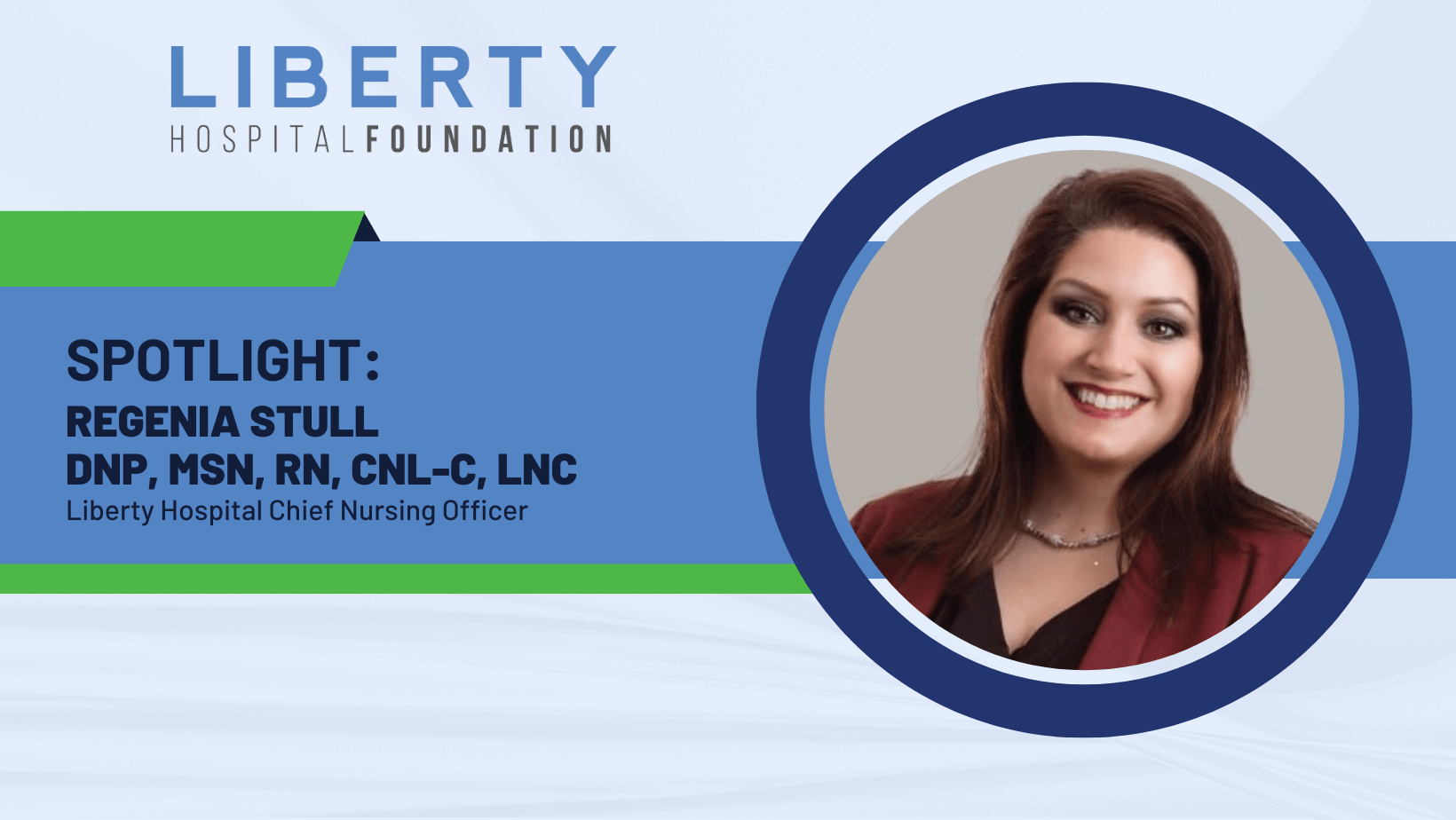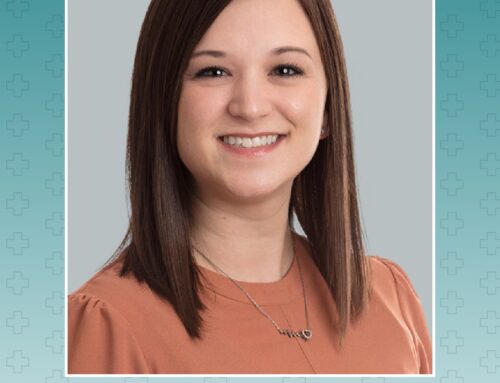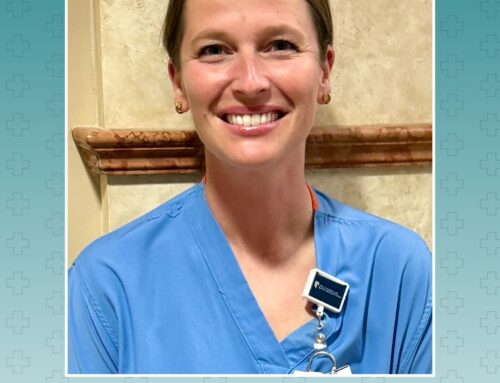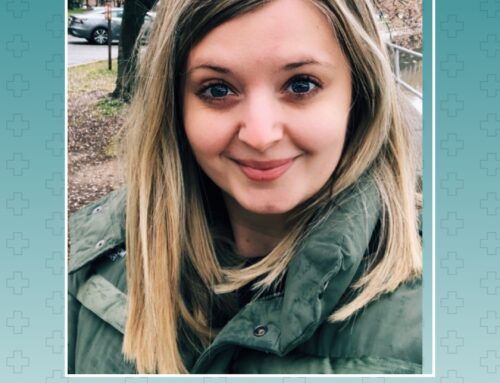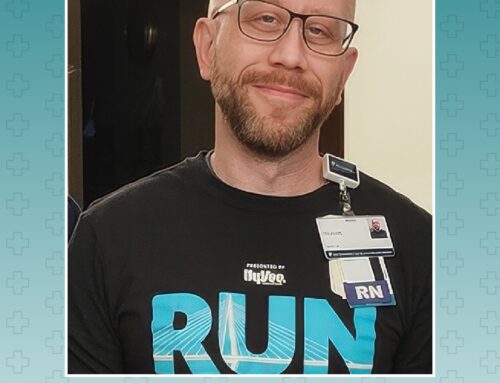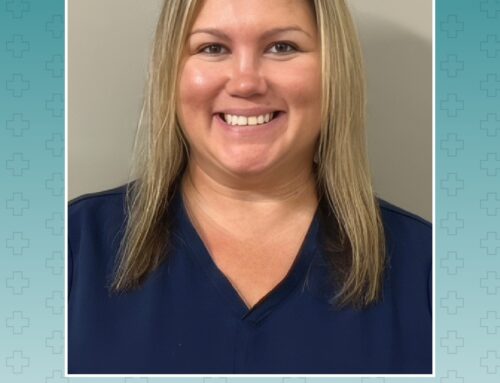Meet Regenia Stull, Liberty Hospital’s Chief Nursing Officer
Regenia brings more than 20 years of nursing leadership experience to Liberty Hospital and has coined the phrase “a nurse to nurses.” Throughout her career, Regenia has traveled the world picking up key insights that have led her journey into leadership. After studying at West Viriginia University and getting married, her husband in active duty Air Force allowed them the opportunity to see many different cities, patient demographics, and experiences. Regenia has been everywhere from WV, South Dakota, Hawaii, Louisiana, and now resides in Missouri. Along the way, she has worked as a C.N.A., OB tech, and an RN working in Critical Care, Emergency Services, and high-risk OB. She has done consulting work for Missouri Hospital Association (MHA), in management and executive leadership roles and has served as a legal nurse consultant. Regenia has recently received honors as a Top 50 Chief Nursing Officer 2024 by Woman We Admire as well as Becker’s Top CNOs to know (I just got the notification for the 2nd award yesterday from Beckers!)
Q: Explain why workplace culture is one of your pillars of nursing leadership?
A: “Throughout my career, I faced severe bullying,” Stull recounts. “The culture in many organizations I have worked is one that seemed to turn their eyes away from the behaviors that caused team embers to leave the organization and sometimes leave their profession altogether. This is never ok!” Because of these experiences and many others along the way, one of Regenia’s goals as a leader is to ensure the culture in which she and the entirety of the teamwork is one that is professional, positive, welcoming and maintains the highest quality standards for patient care. Thankfully, her tenacity to make a culture change in healthcare has been her calling card. “Many hospitals in the Kansas City market are in such close proximity that culture matters even more in employee retention, patient satisfaction, and our culture begins to define who Liberty Hospital is to, and in, the community,” explained Stull. “Some Hospitals are known for specialties, others for cutting-edge technology, and others academic work. Partnering with University of Kansas Health Systems (UKHS), allows us to be part of being a world-leader in many of these areas. Liberty Hospital is not a ‘small community hospital.’ Being community-based just means we focus on recruitment efforts and culture differently, but Liberty Hospital does so much. For example, we do open heart surgery, brain surgery, we deliver babies and have a special care nursery for babies down to 32 weeks of gestation. We do really great things here, it’s important to get the word out there,” Stull proudly commented. “One thing we can always control about culture is what our staff and patients feel in our building,” Stull noted.
Regenia understood the importance of culture work after a personal experience found her in the eyes of a patient. “After my father passed away, I was in a fog for a while. It is just so hard to lose someone you love. When I went back to work, I had to remember to wear a different face in presenting myself,” Stull remembered. “I was at the coffee shop inside the Hospital I worked at and remember seeing a woman looking blankly in the same fogged haze that I had myself felt in grief. I decided to tap her on the shoulder and asked her, ‘is there anything I can do to make this moment better for you?’ and received the fiercest, longest hug I have ever received.” Stull utilizes empathy and human connection as a large piece of culture work; “culture is felt,” she remarked.
Q: From a patient perspective, what do you want the general public to know about challenges and opportunities nurses face today?
A: “One thing that is important to understand,” said Stull, “is that in a matter-of-fact way, nurses join the profession because they want to help people.” Regenia explained that there are many journeys that can lead someone into nursing. What makes nursing so unique, is the concept of marrying clinical knowledge with the artful way of explaining it to patients in a caring and effective way that matters the most. “Of course,” she explained, “there are many different minds in health care that are focused on different specialties; physicians, pharmacists, psychologists, and many more approach patient wellness differently. It is typically the nurses that directly interpret the medical terminology and language in a way a patient can understand so they can then apply that knowledge.”
Q: How has the Foundation helped nurses through its various programs?
A: “The Foundation has helped so many individuals become nurses. Some of these individuals would not have been nurses if it weren’t for the Foundation’s instrumental work in education scholarships; especially through the Stocksdale program. The Foundation working with nursing education to identify opportunities for continuing education is important work,” Stull noted.
“One nurse has the ability to help thousands of people,” Stull explained. “With our staff ratios, let’s say a nurse serves five patients per day. Over the course of the year, between family members they talk to and patients they see, multiplies to over 5,000 lives touched. That’s only one year. Think about how many people one nurse helps over the course of a career; that is the power of sponsoring nursing education.”
Listen to Regenia’s Podcast:
The Heart of Health and Science is a special podcast from Liberty Hospital. We bring minds together in an exchange of ideas that help make the world — and our Northland communities — a healthier, happier place.
For more information, please contact us:
Julie Gilmor
Foundation@LibertyHospital.org
Director of Marketing & Events
(816) 792-7014
The Liberty Hospital Foundation supports patients, individuals, families, and employees in the Liberty Hospital community by creating, funding, and promoting programs that improve health, education, wellness, and care. Make a Gift to support our mission, today!

